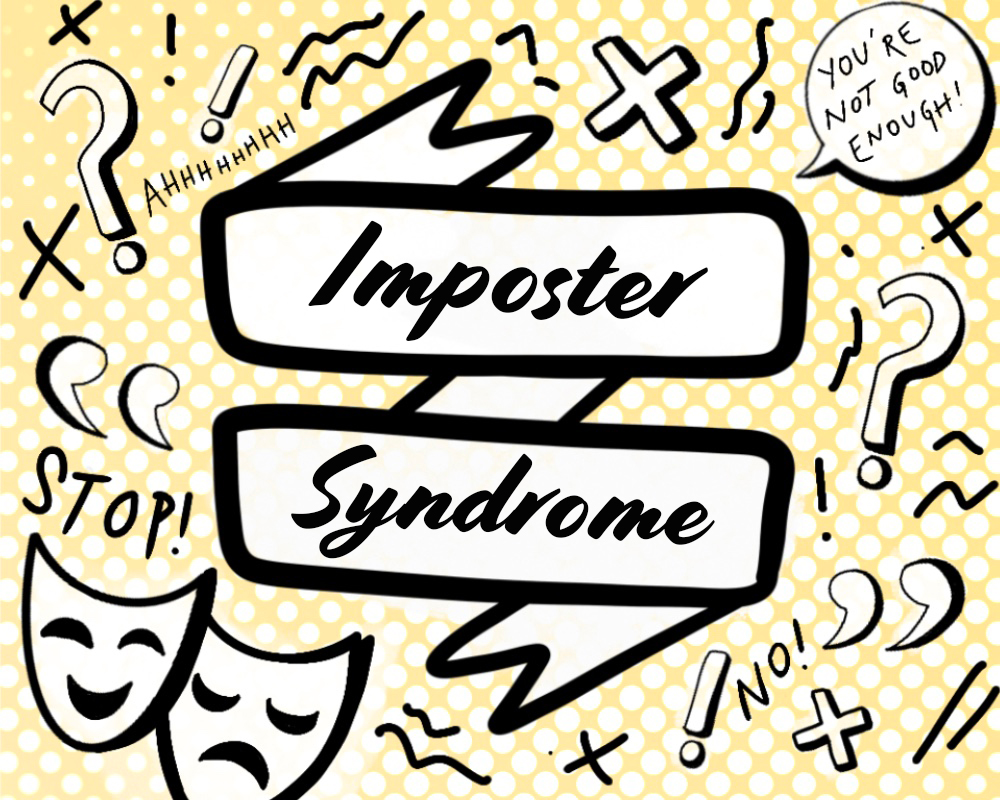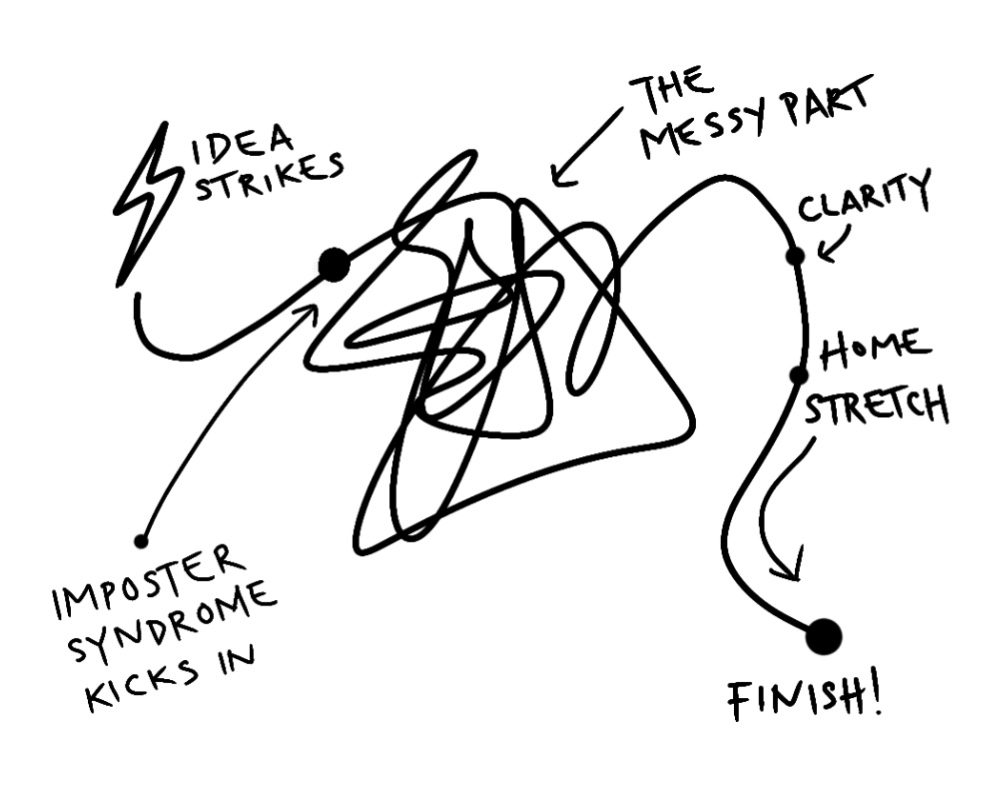The Three Biggest Obstacles Holding You Back From Following Your Creative Desires: Part 2
Dec 01, 2020
AMY DAVIDSON
Part Two: Imposter Syndrome.
Welcome to part two of our three part blog series The Three Biggest Obstacles Holding You Back From Following Your Creative Desires. If you missed Part One: I Don’t Have Time then head over to read the article before you start this one.
This time we’re talking about imposter syndrome, which is strongly linked to the inner critic. These thoughts usually pop up when what’s in your head doesn’t match what you write, paint or make. Have you ever had the experience of having an inspired vision, yet when you start to translate it from the fuzzy land of ideas where normal rules do not apply (like gravity) your creation comes out looking very different from what you first had imagined? *Cue heavy sigh*. Quite often at the beginning of your creative journey there’s a ‘discrepancy gap’ between your creative vision and how you come to create it in the physical world.
Let’s talk about the messiness of the creative process by starting at the beginning. Ideas. I believe ideas come from a place that is located not too far from dreamland, that place we visit every night and where many absurd and surreal things take place. When we try to bring a ‘wild idea’ from this place down to the physical world of pencils, paper, paint and technology almost always something is lost in translation. Elements from the fuzzy dream world are often misinterpreted (just like translations between different languages, where there are not comparable words from one language to the other). On top of all that, it’s one thing to have the idea, but we must remember, that building a skillset in a creative field is just like building our muscles at the gym – it’s not something you can expect to happen on the first or second go, no matter how strong your vision or idea is.
I’d also like to put a little disclaimer here, and that is building your creative skill set and honing your craft is different from creative play, although the two can overlap. Creative play is essential to human wellbeing and it’s where creative expression isn’t based on bettering your skills. It is giving yourself the freedom to play, experiment, make mistakes and be in the creative flow without needing to achieve an outcome.
When we want to get good at expressing our ideas in a particular type of art form, practicing consistently builds your experience, skills and personal style to achieve what you want to express in a way that is more authentic to your original vision.
When this ‘discrepancy gap’ is too big, in strides our inner critic, guns blazing and using this ammunition to tell you that you may as well give up if it wasn’t absolutely perfect on your first or second attempt! It says “you’re not good enough and you won’t make it as a writer / artist / singer” or “YOU’RE AN IMPOSTER! Who are you to put this work out there?” Unfortunately, we have this tainted idea that we need to be a genius at something to enjoy it and to keep doing it and I’d like to put my foot down and say it simply isn’t the case. How many times did you fall while attempting to walk before it was mastered? You probably don’t remember but I’m here to tell you it was more than two times. In fact, if this was the case only about 1% of the population would be walking around and the rest would have given up after the second try and be still getting around on our tummies and that… would be a very different world.

My rendition of the creative process with the addition of imposter syndrome.
New York Times bestselling novelist Karen Thompson Walker shared some advice about using your inner critic as an ally in her ‘Leaning into the Imagination’ workshop at the 2019 Brisbane Writers Festival. Walker says “If you know something isn’t quite right with your work or it needs more development stay in the ‘wrong’ of it without being hard on yourself. Use your inner critic to make your work better, without the shaming!” In the workshop, Walker guided us to really enquire what doesn’t seem to be working in our piece or practice (and this can relate to any creative pursuit).
Powerful questions lead to powerful answers, so turn the spotlight on your work and ask open ended questions to see the ‘problem’ from another point of view. What’s a powerful question you may ask? Aaron Levy Founder & CEO of Raise The Bar Consulting shares some points in his Forbes article on How To Ask More Powerful Questions.
Levy found the main attribute in asking powerful questions (without making yourself feel like a loser and setting off the inner critic) is curiosity! His tip is to get playful and invoke your three year old self from the angle of really wanting to explore something through the lens of curiosity. So, what would your three year old self ask about the plot hole in your novel or why a part of your painting isn’t working? Try turning off your emotional brain and test solutions in a more diagnostic way like a scientist. Enquire as to ‘what about it doesn’t seem to be working’ and test solutions in a non-emotional, diagnostic way.
Here’s some of Levy’s tips for asking powerful questions to better your work:
• Is the question open-ended? Ask what, when or how instead of asking a yes or no question.
• Come from a beginner’s mindset. Start by telling yourself, “I don’t know the answer”. This leaves endless possibilities for the solution to arise.
• Is the question clear and succinct? Don’t use too many words.
• Is the question impactful?
• Let the question happen in the moment. This here is probably the most crucial point to remember about powerful questioning. You can’t plan it. Formulaic questions outlined before the conversation won’t work – you have to be in the moment.
“Quality questions create a quality life. Successful people ask better questions, and as a result, they get better answers.”
– Tony Robbins
Australian novelist, Melanie Cheng, a panelist on the “Inside the Creative Life” panel at the 2019 Brisbane Writers Festival, shared her views on Imposter Syndrome being the seeking of validation so you can say, “I belong here”. The funny thing is, our brains are biologically hardwired to look for the negative stuff and hold onto that and that is how we’ve survived as humans for 200,000 years.
So, let’s flip that on its head again and bring that awareness to in the early stages of your craft. Your brain may seem like it’s your own worst enemy but in fact it’s trying to preserve your survival by keeping you out of dangerous situations, and this includes having your ego deflated! Know that your inner critic is really afraid of the danger it perceives in putting your work out there and not having everything go exactly to plan first time (which never happens by the way).
Imposter Syndrome is something that is universal and we’ve all felt at some stage of our lives. However, if we don’t bring awareness to the fact that this mode of thought is trying to keep us safe, it can actually keep us very small too. By bringing awareness to the voice of our inner critic inside our head and acknowledge our fears are only one part of us, not our entirety we can take back the steering wheel on our creativity journey. This way we can pause and be aware of our fears, accept they are here because they care about us, and move forward without being held prisoner by them.
Need some more nudges to move past your inner critic?
The Three Biggest Obstacles Holding You Back From Following Your Creative Desires : Part One. All to familiar with the phrase “I Don’t Have Time”? Then this post is for you.
Meditate Your Inner Critic Away: Learn how to slip past that naysayer internal voice.
Bridle Your Backbiter and Slay Your Self-Doubt :read on for the how-to on creative confidence.

